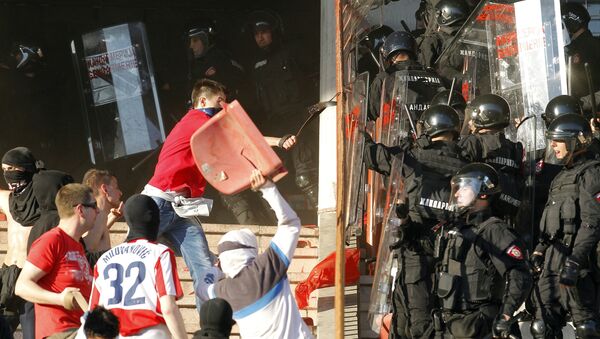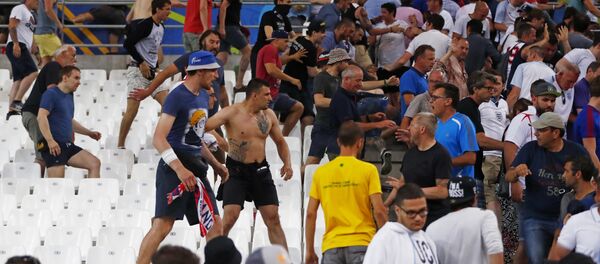The interview came after the release of a BBC documentary "Russia's Hooligan Army," which brings back memories of last year's brawls between British and Russian fans during a UEFA Euro game in France. It warns about a "festival of violence" allegedly awaiting British fans during the 2018 World Cup in Russia.
The film, which aired late last Thursday, relays the events of the UEFA Euro 2016 championship in France, when at least 30 people were injured in clashes between Russian and English fans after a football match in Marseille.
"I think it's very difficult to identify national trends when it comes to football violence. The bottom line is that some football clubs have, at different times, problems pertaining to violence caused by their fans' actions," Geoff Pearson said, referring to "some particular clubs in England" that currently face the relevant problems.
He said that more efforts are needed to try to contain football violence because fully doing away with this evil is almost impossible.
"I don't think that it is possible for any government to eradicate this issue," Pearson said, adding that the authorities should do more to try to reduce the number of incidents related to football violence and reduce the number of people involved in these incidents.
He also underscored the importance of the authorities protecting non-violent fans from the football hooligans' attacks.
"I think that [in the future] it's perfectly possible for Russian authorities to prevent incidents similar to what happened in France," Pearson said.
He described fears related to the possibility of British fans exacting revenge for the 2016 incident in France during the 2018 World Cup in Russia as "misplaced."
Meanwhile, Vladimir Markin, head of the Russian Football Union's committee for security and working with fans, slammed the BBC documentary as a propaganda piece aimed at discouraging Britons from traveling to Russia for the 2018 FIFA World Cup.
"This is a propaganda piece aimed at discrediting Russia, Russian football, and the World Cup in particular, to prevent as many British fans as possible from traveling to the World Cup. There is no other purpose. When there are no facts, any means will do. They are not averse to anything. The BBC has repeatedly shown its so-called objectivity toward Russia," Markin told R-Sport.
It added that the BBC appeared to be doing its best to discredit Russia ahead of the cup.
The 2018 FIFA World Cup will be held at venues in more than 10 Russian cities in June and July 2018. The event will be the first-ever World Cup to take place in Eastern Europe.
Have you heard the news? Sign up to our Telegram channel and we'll keep you up to speed!






